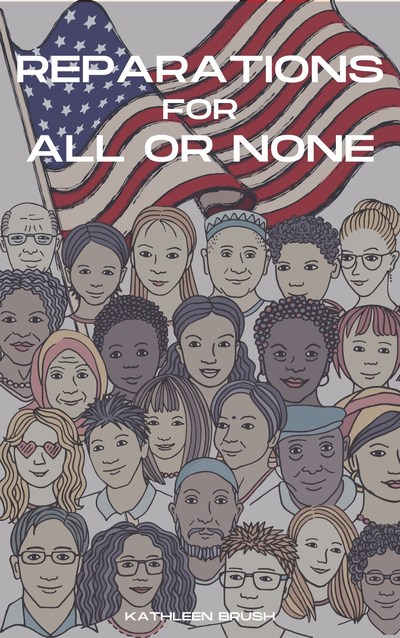SEATTLE, April 20, 2022 /PRNewswire/ — "Reparations for All or None," by Kathleen Brush, Ph.D., examines the biases and privations endured by waves of immigrants to America since 1607. Brush unpacks important insights to identify potential receivers and payers of reparations. Today, candidates for reparations are assumed to be the descendants of slaves, but using a yardstick of acceptable and legal behaviors today, millions of others endured a similarly unbearable existence. Candidate payers of reparations are assumed to be taxpayers, but this places injustice on top of injustice.
Brush identifies and elaborates on why specific ethnic, racial, social, and religious groups are candidate recipients, and she does the same for the nations, groups, and individuals that are candidate payers. She also notes a major problem with potential payers and receivers. "Actions considered inhumane today were legal and ordinary yesterday. History is like that; it never measures up to modern standards."
"Reparations for All or None" starts with an important but muted premise. America was doomed. Nations that enjoyed peace and prosperity were racially, ethnically, and religiously homogenous. That was neither the Thirteen Colonies nor the United States. In the 18th and 19th centuries, experts predicted that America would fail from conflict inherent in diverse populations. Brush said, "It’s a wonder it did not. Animosities filled the air. Racial, ethnic, and religious discord were part of life in America." Brush notes, "the United States is still not out of the water because policymakers are naïve about diversity dynamics."
"Immigrants have been streaming to our shores for hundreds of years, and government leaders are obtuse to the complex interactions of diverse populations. They act as if it’s normal for diverse nations to resemble a courteous forum at the United Nations. What other explanation could there be for passing the Civil Rights Act of 1964 to address a long history of racial, ethnic, or religious animus, and passing, in 1965, the most open immigration policy in the world. Pouring unlimited diversity on top of a nation that just committed to trying to end animosities among its current diverse population was reckless. Adding Great Society policies in 1964-1965 on top of this, however well intentioned, made things worse for any melting in the pot."
American naivete on diversity dynamics is why problems are unaddressed or wrongly addressed. "The year 1965 ends the long era of black and white America. Today, more than 25% of Americans are neither African- nor European-American. For the diverse immigrants arriving after 1965, life in America is a relative cakewalk, but nativist African-, European- and Native American populations are experiencing issues related to increased biases and competition, but legislators stuck in a black and white America are wearing blinders."
These blinders have real consequences. "Immigrants have always been America’s ultimate source of competitive advantage. But the advantage has three pre-requisites. America must inspire immigrants to work hard to become self-reliant, immigrants must be law-abiding, and Americans must up their game. The government has been granting immigrants blanket pre-req waivers for being self-reliant and law-abiding. This dilutes the power of immigrants and increases potential harm to Americans. The damage to America because all Americans are not upping their game is incalculable because this leaves them as weak competitors for jobs and other resources. This is a source of cascading problems that are tied to misdiagnosing problems as products of racism."
Brush said, "bad policy decisions and misguided activism is fueled by historical revisionists portraying America as the home of irredeemably white-supremacist Jim Crow clones, and white privileged people who were genocidaires who stole the land of Indians, sponsored the cruelest episode of slavery in the world, robbed the land of Mexicans, and uniquely interned American citizens during WWII because of their race. America is so evil; it must pay reparations to the descendants of its victims. America is a country whose history in a global context is to be admired, but these untruthful and shameful portrayals prevent that. Instead, there are increased hate crimes, declining race relations, and economic stagnation for some groups. "Reparations for All or None" sets the record straight. Continuing American peace and prosperity depend on it.
This is the fourth book by Brush leveraging extensive research to examine race in America and the world. Brush draws on 12 years of research, including being onsite in 114 nations. Placing America’s history of immigration and the "melting pot" into a global context will have American readers singing "God Bless America" by the end of the book.
A limited number of books are available for free to schools that select "Reparations for All or None" as required reading, or for library access.
Books can be purchased on Amazon.com.
Contact
Jan Bianchi
772-213-9778
Kathleenbrush.com
334535@email4pr.com
SOURCE Kathleen Brush



